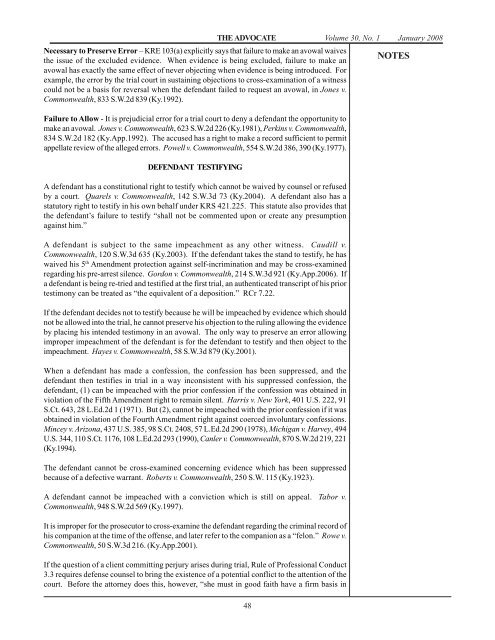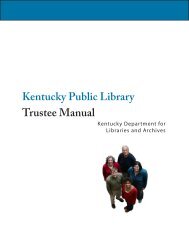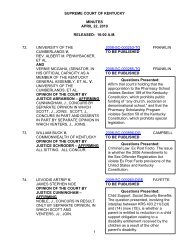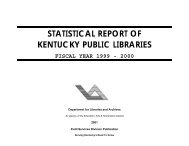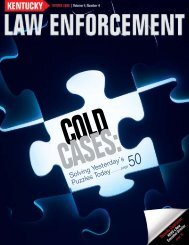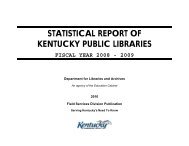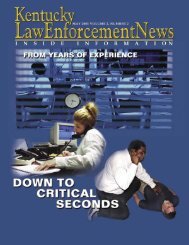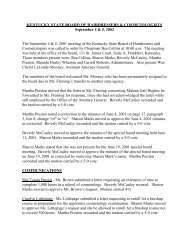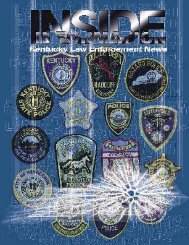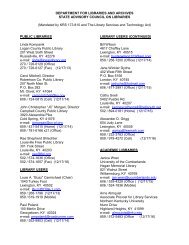Jan08 Advo.pmd - e-archives Home
Jan08 Advo.pmd - e-archives Home
Jan08 Advo.pmd - e-archives Home
You also want an ePaper? Increase the reach of your titles
YUMPU automatically turns print PDFs into web optimized ePapers that Google loves.
THE ADVOCATE Volume 30, No. 1 January 2008<br />
Necessary to Preserve Error – KRE 103(a) explicitly says that failure to make an avowal waives<br />
the issue of the excluded evidence. When evidence is being excluded, failure to make an<br />
avowal has exactly the same effect of never objecting when evidence is being introduced. For<br />
example, the error by the trial court in sustaining objections to cross-examination of a witness<br />
could not be a basis for reversal when the defendant failed to request an avowal, in Jones v.<br />
Commonwealth, 833 S.W.2d 839 (Ky.1992).<br />
Failure to Allow - It is prejudicial error for a trial court to deny a defendant the opportunity to<br />
make an avowal. Jones v. Commonwealth, 623 S.W.2d 226 (Ky.1981), Perkins v. Commonwealth,<br />
834 S.W.2d 182 (Ky.App.1992). The accused has a right to make a record sufficient to permit<br />
appellate review of the alleged errors. Powell v. Commonwealth, 554 S.W.2d 386, 390 (Ky.1977).<br />
DEFENDANT TESTIFYING<br />
A defendant has a constitutional right to testify which cannot be waived by counsel or refused<br />
by a court. Quarels v. Commonwealth, 142 S.W.3d 73 (Ky.2004). A defendant also has a<br />
statutory right to testify in his own behalf under KRS 421.225. This statute also provides that<br />
the defendant’s failure to testify “shall not be commented upon or create any presumption<br />
against him.”<br />
A defendant is subject to the same impeachment as any other witness. Caudill v.<br />
Commonwealth, 120 S.W.3d 635 (Ky.2003). If the defendant takes the stand to testify, he has<br />
waived his 5 th Amendment protection against self-incrimination and may be cross-examined<br />
regarding his pre-arrest silence. Gordon v. Commonwealth, 214 S.W.3d 921 (Ky.App.2006). If<br />
a defendant is being re-tried and testified at the first trial, an authenticated transcript of his prior<br />
testimony can be treated as “the equivalent of a deposition.” RCr 7.22.<br />
If the defendant decides not to testify because he will be impeached by evidence which should<br />
not be allowed into the trial, he cannot preserve his objection to the ruling allowing the evidence<br />
by placing his intended testimony in an avowal. The only way to preserve an error allowing<br />
improper impeachment of the defendant is for the defendant to testify and then object to the<br />
impeachment. Hayes v. Commonwealth, 58 S.W.3d 879 (Ky.2001).<br />
When a defendant has made a confession, the confession has been suppressed, and the<br />
defendant then testifies in trial in a way inconsistent with his suppressed confession, the<br />
defendant, (1) can be impeached with the prior confession if the confession was obtained in<br />
violation of the Fifth Amendment right to remain silent. Harris v. New York, 401 U.S. 222, 91<br />
S.Ct. 643, 28 L.Ed.2d 1 (1971). But (2), cannot be impeached with the prior confession if it was<br />
obtained in violation of the Fourth Amendment right against coerced involuntary confessions.<br />
Mincey v. Arizona, 437 U.S. 385, 98 S.Ct. 2408, 57 L.Ed.2d 290 (1978), Michigan v. Harvey, 494<br />
U.S. 344, 110 S.Ct. 1176, 108 L.Ed.2d 293 (1990), Canler v. Commonwealth, 870 S.W.2d 219, 221<br />
(Ky.1994).<br />
The defendant cannot be cross-examined concerning evidence which has been suppressed<br />
because of a defective warrant. Roberts v. Commonwealth, 250 S.W. 115 (Ky.1923).<br />
A defendant cannot be impeached with a conviction which is still on appeal. Tabor v.<br />
Commonwealth, 948 S.W.2d 569 (Ky.1997).<br />
It is improper for the prosecutor to cross-examine the defendant regarding the criminal record of<br />
his companion at the time of the offense, and later refer to the companion as a “felon.” Rowe v.<br />
Commonwealth, 50 S.W.3d 216. (Ky.App.2001).<br />
If the question of a client committing perjury arises during trial, Rule of Professional Conduct<br />
3.3 requires defense counsel to bring the existence of a potential conflict to the attention of the<br />
court. Before the attorney does this, however, “she must in good faith have a firm basis in<br />
48<br />
NOTES


